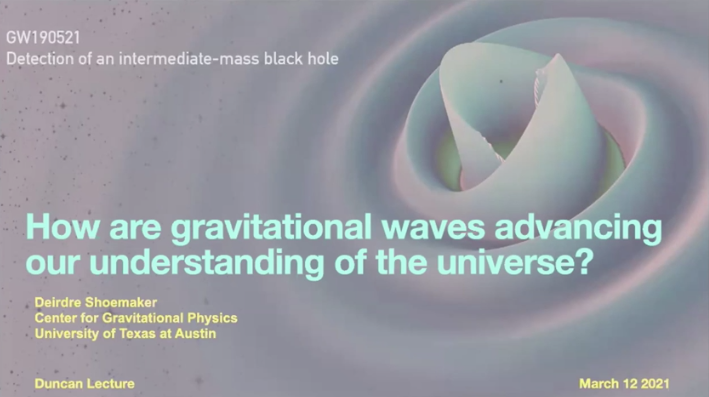Annual Duncan Lecture discusses black holes and gravitational waves
“I study objects where all matter has been forgotten,” explained Dr. Deirdre Shoemaker, a theoretical physicist who researches the effects black holes have on our universe.
On Friday, March 12, Shoemaker was the featured speaker for the 2021 Annual Duncan Lecture. Her anticipated speech, How are gravitational waves advancing our understanding of the universe, was attended by faculty, staff, and students.
“Large stars can become black holes or extremely dense and complicated neutron stars,” she shared. “I study black holes and their oscillations in space. Think of them as ripples in the fabric of the universe.”
As a professor of physics and director of the Center for Gravitational Physics at the University of Texas at Austin, Shoemaker discussed how gravitational waves were discovered in 2015 with the Laser Interferometer Gravitational-Wave Observatory (LIGO) Scientific Collaboration, 4 kilometer large tunnels that use laserlight to pick up the tiny ripples in space.
“As a graduate student in the late 1990s, I saw an incredible opportunity to study objects in the universe,” she said. “The two LIGO observatories in Hanford Washington and the other in Livingston, Louisiana, were being constructed during that time from 1994 – 2000.”
Shoemaker uses the world’s most powerful computers to understand how black holes end up on collision courses and how this affects the universe around them.
“My team of graduate students and postdocs help me create 3D images of gravitational waves resulting from the collision of two black holes and run calculations to solve for the dynamics of and gravitational radiation emitted by the collision with the help of a supercomputer,” she added
She concluded her presentation with a snapshot of the future.
“Estimated in 2035, in a partnership lead by the European Space Agency and NASA, the LISA Consortium will include 3 satellites orbiting the sun about 2.5 million kilometers apart,” Shoemaker said. “In the next few decades, we will be able to learn even more about our incredible universe.”
Once her presentation was finished, Shoemaker answered questions for more than 30 minutes. An array of undergraduate students, graduate students, alumni, and faculty asked in-depth questions about her research and insight of the world of physics.
Watch the recorded presentation.
The Annual Duncan Memorial Lecture, established in 2012 by Dora Duncan '48 in chemistry, commemorates her husband, Dr. M.M. "Dunc" Duncan, Jr., '49, a physics alumnus. An active amateur astronomer, it is with respect to his enduring interest in the field, combined with his penchant for exploration, discovery and knowledge of astronomy and astrophysics, that this lecture is dedicated. It is a free, annual astronomy lecture held at Auburn University open the entire community.
Latest Headlines
-
04/18/2024
-
04/18/2024
-
04/18/2024
-
04/17/2024
-
04/12/2024

